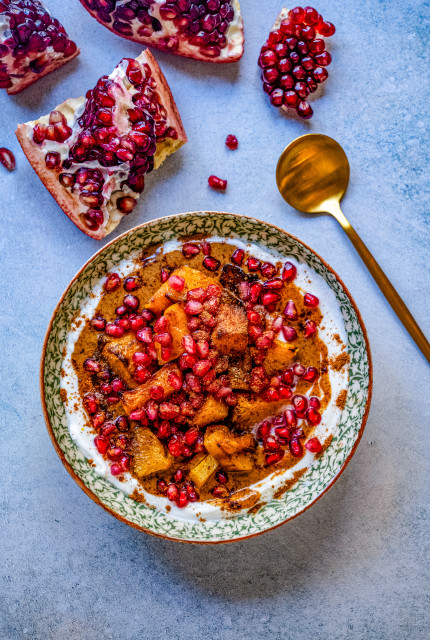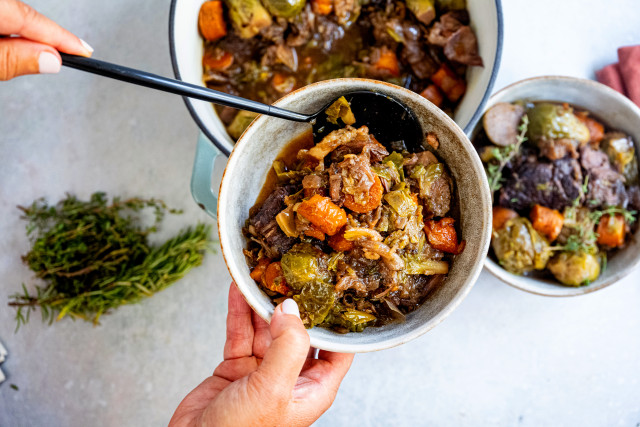
Why Am I So Tired?
Do you roll out of bed and throw on the Keurig before your eyes fully open?! Feel like you can’t escape the post-lunch energy slump?! You are not alone! Our dietitians have worked with thousands of clients to help them improve energy since fatigue can feel so debilitating. There are a number of reasons for why you may feel tired often. We’re here to break several of them down & arm you with solutions!
Hydrate.
It’s not a secret that many of us could do a better job hydrating. Dehydration is one of the fastest ways to get premature wrinkles and deplete energy. Suboptimal hydration has been associated with worsened working memory as well as increased anxiety and fatigue.
Key factors to think about for hydration:
- Drink half of your body weight in fluid ounces
- Prioritize filtered water with reverse osmosis and add back trace minerals
- Add electrolytes, especially if you are doing a lot of sweating, to bring the water into the intracellular space
A good tip is to aim to drink water before caffeine - start your day with that glass or two, and then fill up a bottle like this one for the first half of the day and aim to refill again for the second half!
Gimme that sunshine.
Getting sunlight in your eyes within the first hour or so of waking is so crucial for supporting better energy throughout the day. Feeling low energy come 2PM? You can still get those benefits. Personally, within a minute - honestly it feels like even seconds – of stepping outside to some sunshine, I feel more energized, inspired and uplifted!
Added benefit: Getting sunshine first thing in the morning can actually set you up for better sleep that night; that’s because sunlight first thing supports a sooner rise in nocturnal melatonin come the evening, a hormone that is key for quality sleep.
Protein first.
One of the nutrients we see clients falling short on is protein. Meeting your protein needs is key for reducing sugar cravings and keeping blood sugar more stable. The foundation of cellular metabolism is whole foods and the macronutrients that you get from those foods including carbohydrates, fats and proteins. But it’s important to eat them in the right combination and balance to support a balanced blood sugar response. We typically recommend to aim for a minimum of 25gm of protein to kick off your day on a more balanced note! Because many conventional breakfasts are higher in carbohydrates and lower in protein - think: cereal, waffles, pancakes, bagels - this smaller change can yield a big change in energy. Some great examples of protein-rich breakfasts include:
- A balanced smoothie, like our Mixed Berry Smoothie!
- 3-4 scrambled pasture-raised eggs with sauteed baby spinach or kale and a slice of toast
- Plain grass-fed Greek yogurt or cottage cheese with mixed berries, nuts and a tsp of ground flax or chia
What you eat (& drink!) impacts your sleep.
Quality sleep is probably one of the most universally desired things. But it can be quite a struggle to achieve. The factors that can contribute to good vs poor quality sleep are many, ranging from stress to blue light down to what we eat and drink. Here are a few nutrition tips to help you sleep better, reaching those deep and restorative stages of sleep for longer, and therefore have greater energy the next day!
- Alcohol: You probably knew this one was coming right? Alcohol can make you fall asleep better but the quality of sleep tends to be very restless, leaving you feeling tired and in immediate need of a bagel and some coffee when you wake up (both short-term, non-sustainable fixes for energy lulls). Drinking a less sugary option may help a tad but in the end, alcohol will lead to disrupted sleep so try to keep it to a minimum.
- Sugary snacks before bed: We recommend that if you truly want that sweet thing (vs grabbing it out of habit), to mindfully choose it and aim to eat it soon after your protein & fiber-rich dinner. That way your blood sugar won’t spike as dramatically, setting you up for poor sleep. When you have the sweet on its own, let’s say 2 hours after dinner, the blood sugar spike and crash that follows contributes to restless sleep. We see this on our client’s sleep trackers regularly (ex: Oura or Whoop). This in turn yields more sugar cravings the next day!
- Caffeine: The average half-life of caffeine is 5 hours but can be as much as 9 because each person has an individualized response. We recommend to cut the caffeine after 12PM so you’re set up for a sounder sleep that night.
Curious how what you eat impacts how you sleep? Our 7 day Food Symptom Journal can help provide some valuable insight!
B12 deficiency.
Low levels of vitamin B12 are more common than once thought, and can be a contributing factor in feeling fatigued. There are a few reasons why you can have low vitamin B12 levels including:
- Inadequate B12 from the diet with some of the best absorbed sources being meat and fish
- Pernicious anemia, an autoimmune condition making it difficult for your body to absorb B12
- Certain medications can reduce absorption of B12, including protein pump inhibitors (PPIs) and metformin
- Surgeries or conditions related to the gastrointestinal tract, including gastrectomy, gastritis, Celiac disease, and Crohn’s disease
- MTHFR gene mutations that are prevalent in about 40% of the population.
Gratefully, a simple blood test – which we do in our programs! – can reveal if you’re low in B12 and supplementing appropriately based on your individual needs can improve energy! Conventional tests don’t look at your functional vitamin B12 status but since we run organic acids testing, we are able to determine what that is.
If you are interested in learning more about how to improve energy, checkout this youtube video that our founder, Brigid, recorded with extra science-based tips.
We are so inspired to help you gain that confidence in your own personal needs and goals that we created our free, easy-to-use 7 day Food Symptom Journal. It is a great space to record what you’re eating as well as any symptoms you may feel throughout the day - one of which being your energy levels. It’s incredible how insightful just one week of mindfulness around the relationship of food & symptoms can be!


